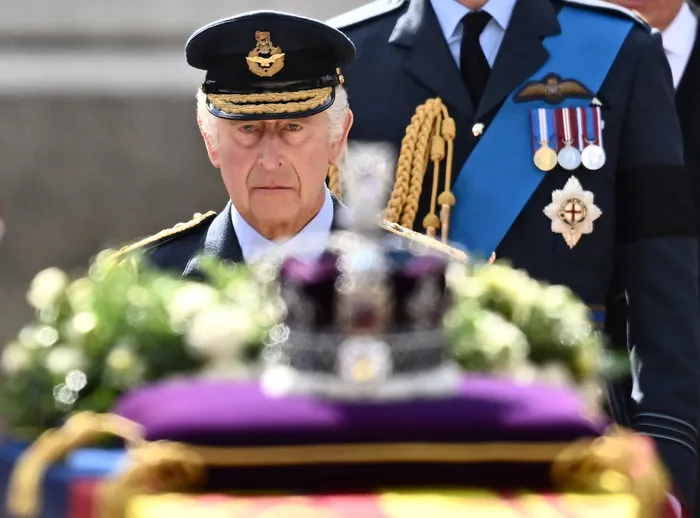A Global Britain post-Brexit, Covid, and the Queen?

Picture: Marco Bertorello / AFP/ PICTURES OF THE YEAR 2022 Britain's King Charles III walks behind the coffin of Queen Elizabeth II, adorned with a Royal Standard and the Imperial State Crown and pulled by a Gun Carriage of The King's Troop Royal Horse Artillery, during a procession from Buckingham Palace to the Palace of Westminster, in London on September 14, 2022. The Queen’s death, together with other political events such as Brexit and the Covid pandemic, will have a far-reaching impact on Britain’s national identity and even more so on its role and position in the world, the writer says.
By David Monyae
In the recent past Britain has witnessed watershed political events such as Brexit in 2016 and the death of its longest serving monarch, Queen Elizabeth II, in 2022. Queen Elizabeth was succeeded by her son King Charles III who is due for coronation on the 6th of May. King Charles has big shoes to fill as his mother was a global icon who became the face of Britain for almost 6 decades.
These changes, together with the global Covid-19 pandemic, will have a far-reaching impact on Britain’s national identity and even more so on its role and position in the world. The country’s leadership was well aware of this.
Following Britain’s European Union (EU) referendum in 2016 in which the British electorate voted to withdraw from the EU, the leadership of Britain’s ruling party, the Conservatives, floated the idea of a Global Britain. The Global Britain concept tries to redefine the United Kingdom’s position in and relationship with the world after its exit from the EU. The government of the UK defined it as cultivating and nurturing the country’s relationships, protecting a rules-based international order, and amplifying the UK’s role and voice on the world stage.
The former Foreign Secretary in the UK, Dominic Raab, elaborated that the Global Britain vision was centred on free global trade, championing human rights, leading action on climate change, and promoting global security. He asserted that a Global Britain will be a force for good. The Global Britain mantra was further articulated in the Integrated Review (IR21) released by the government in 2021. The IR21 was a comprehensive national strategy encompassing international development, national security, defence policy and foreign policy.
The Global Britain project sought to leverage Britain’s national assets to amplify the country’s influence and power in the world. Britain is a middle power with the 6th largest economy in the world boasting a gross domestic product of US$3.2 trillion and a per capita income of over US$47,000. Britain is also a nuclear power and has the 4th biggest military budget in the world, which is estimated at US$55 billion.
The country also sits in the United Nations Security Council (UNSC) as one of the five permanent members. The UNSC is responsible for ensuring global peace and security. Further, the UK has a vibrant and robust innovation ecosystem and boasts of some of the best universities in the world with a reputation for producing top talent.
One of the UK’s most important sources of influence and soft power has been its role as one of the world’s most prominent sources of development aid, which has long been a part of the UK’s foreign policy. Moreover, those in support of the withdrawal from the EU were confident that the UK would use its newfound autonomy and independence from the regional organisation to pursue a security and economic policy that would effectively project the country’s power and influence.
Questions were, however, asked about the UK’s diplomatic standing in the world after its exit from the EU. Some have argued that the UK’s withdrawal from the EU will diminish its diplomatic stature since it will not be speaking on behalf of Europe anymore. Outside Europe, the UK’s geopolitical weight and influence was likely to be severely constrained.
The UK’s leaders have been hard at work trying to carve a place in the world for their country to turn the Global Britain vision into a reality since the finalisation of the Brexit deal in 2020. However, the going has been tougher than the proponents of Brexit anticipated. Prime Minister Rishi Sunak’s government has since updated the IR21 to the IR23. The IR23 is in a way a climbdown from the rather grandiose claims of a world-beating Global Britain. The update is a response to major geopolitical changes including Russia’s military operation in Ukraine, China’s more assertive stance especially in the Indo-Pacific and the impact of the Covid-19 pandemic, which battered the global economy. Moreover, the UK failed to achieve any major breakthrough in climate change talks when it hosted the United Nations Framework for Climate Change Convention (UNFCCC) Conference of the Parties (COP26) in Glasgow in 2021.
It has also found it difficult to offer any reassurances to British passport holders in Hongo Kong after the passing of the national security law, which brought the region firmly under the grip of Beijing. Thus, while the Global Britain strategy overestimated the UK’s capacity and influence, the new IR23 is more pragmatic and seeks partnerships with like-minded actors such as the EU, Canada, Australia, Japan, and the US. Therefore, outside the EU structures the UK may enjoy more formal sovereignty but its practical choices for action are limited and narrow.
The only way the UK can play a meaningful role in the world post-Brexit is to create strategic alliances with its traditional western partners and other regions like Africa, the Middle East, and Latin America. Brexit has failed to turn back the clock to the pre-20th century Pax Britannica when Britain ruled the waves.
David Monyae is Associate Professor of International Relations and Political Science, and Director of the Africa-China Studies Centre at the University of Johannesburg
This article is exclusive to The African. To republish, see terms and conditions.